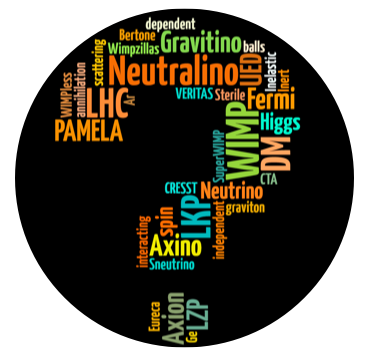Dark Matter

Everything we see when we look at the sky with the naked eye, or even with the most powerful telescopes, is made of the same fundamental constituents. Planets, stars and gas are in fact made of the same atoms that constitute the matter we are familiar with on Earth, including organic matter, and therefore ourselves.
However, a wide array of indirect observations provides compelling evidence for a new form of matter, known as Dark Matter, which is profoundly different from, and 5 times more abundant than, ordinary matter. The aim of my research program is to exploit the experimental results of the Large Hadron Collider at CERN, and of the upcoming generation of Astroparticle experiments, to identify the nature of Dark Matter particles
More information can be found in this Nature paper (free arXiv version here)
For further details check out the review article: Particle Dark Matter: Evidence, Candidates and Constraints (Gianfranco Bertone, Dan Hooper and Joe Silk, Phys.Rept.405:279-390,2005)
Machine Learning applications to fundamental physics
Organising the avalanche of data from upcoming particle and astroparticle experiments in a coherent and systematic way, and understanding their implications for the identification of dark matter, is one of the greatest scientific challenges of this decade, upon which depends the future of particle and astroparticle physics.
The booming field of machine learning, sitting at the intersection of computational statistics, optimization, and artificial intelligence, offers a unique opportunity to tackle this challenge. Due to enormously increased data, and developments in algorithms, hardware, and software, the field of machine learning has in fact witnessed unprecedented progress over the past decade.
For more information, see:
- the workshop “Accelerating the Search for Dark Matter with Machine Learning” at the Lorentz Center
- the paper “Accelerating the BSM interpretation of LHC data with machine learning“
- the paper “Identifying WIMP dark matter from particle and astroparticle data“
- the website of the DarkMachines initiative